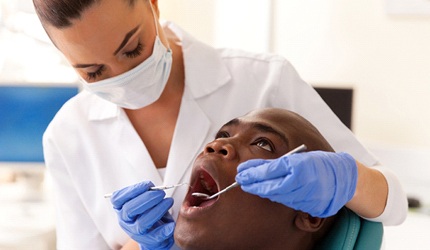Tooth Extractions – DeSoto, TX
Safe, Effective and Comfortable Tooth Removal
Tooth extractions are not the first choice Dr. Najjar makes at Amaze Dental. Ideally, our team would prefer to save and restore teeth however possible. If a tooth is significantly damaged or putting neighboring teeth at risk, we’ll do everything we can to make your next treatment comfortable. We take all the steps to ensure that your tooth extraction in DeSoto is safe as well as discuss your tooth replacement options. To get started, contact our dental office and schedule your next appointment!
Why Choose Amaze Dental for Tooth Extractions?
- Dental Implants Available In-House
- Safe and Effective Tooth Removal via Laser Dentistry
- Sedation and Computer-Assisted Local Anesthesia
Reasons Why Tooth Extractions Are Necessary

We consider tooth extraction to be an absolute last resort, which means if we recommend one, it’s because there is a significant issue with your tooth that cannot be resolved with other dental services. We may suggest a tooth extraction in the following circumstances:
- Severe damage to the tooth, either as a result of decay or injury that cannot be restored with a crown
- The socket responsible for holding the tooth in place has failed due to severe gum disease
- Room must be made so a denture can be worn
- The tooth has become impacted (or trapped underneath gum tissue or an existing tooth)
- To make room for orthodontic treatment
Keep in mind that teeth that have become severely damaged and cannot be saved through root canal therapy are also removed to prevent the infection from spreading to other parts of the mouth.
The Process of Removing a Tooth

During your visit, we’ll make sure that you’re feeling comfortable and administer all local anesthesia as needed. If you’d prefer to be even more relaxed during the procedure, you can take advantage of our multiple sedation options.
After locating the tooth in question, we’ll use a dental elevator to gently remove the tooth from the periodontal ligament holding it in place. Then, we’ll use a pair of dental forceps to remove the tooth and ask you to bite down onto a gauze pad to reduce any bleeding. From there, we’ll break down exactly what you can expect over the next few days as your mouth starts to heal.
Before you leave, we may also recommend thinking about future tooth replacement options to make your smile complete again. This could include dental bridges, dentures, or dental implants.
Tooth Extraction Aftercare

It is extremely important that you keep your extraction site as clean as possible during your aftercare period. We’ll break down all the aftercare steps you will need to follow before you leave our office. Some of these steps include:
- Take all prescribed medications as instructed by our office
- After about 24 hours following your removal, rinse your mouth out with salt water (roughly 8 ounces of warm water for every teaspoon of salt) to keep the site clean. You may also use a prescription oral rinse if you have it
- Do not smoke or use tobacco in any form
- Do not use any straws, especially over the next several days
- Keep your head propped up while sleeping
- Get plenty of rest
- Drink water regularly throughout the day
Understanding the Cost of Tooth Extractions

Even if you’d like an extraction, you might hesitate due to the potential expense. After all, there’s no point in pulling a tooth if you can’t afford to do so. However, the cost of tooth extraction in DeSoto varies from patient to patient. You can thus only get a treatment estimate at an in-person consultation. Fortunately, we at Amaze Dental will walk you through every step of the financing process. If you’d like to learn more, just keep reading or call our office for more details!
Factors That Can Affect Tooth Extraction Cost

To fully determine your extraction’s cost, our team will need to assess the tooth (or teeth) in question. In particular, we’ll examine it (or them) in light of the following factors:
- Tooth Location & Type: Depending on whether it’s a molar, canine, or so on, extracting a given tooth will cost more or less. Of course, pulling several teeth will also be more expensive than just pulling one.
- Extraction Difficulty: Per its name, a simple extraction is straightforward and thus less costly. In contrast, an impacted extraction is complex and can get expensive.
- Tooth Replacement Options: Treatment costs more if you follow an extraction with a tooth replacement service. Furthermore, some restorations are pricier than others — implants involve more expenses than dentures, etc.
Does Dental Insurance Cover Tooth Extractions?

Put simply, yes — dental insurance often does cover tooth extractions. In fact, a policy’s coverage will usually extend to 50% of an extraction’s cost.
All the same, there may be restrictions. Some dental plans only cover some teeth, while others have a waiting period before coverage starts. As such, you should confirm the details with your insurance provider first. If you want, our team can even assist you with doing so.
How to Make Tooth Extractions Affordable

Of course, you can have an affordable tooth extraction even without insurance.
- Membership Plan: For a low yearly fee, our office’s membership plan can give you a 25% discount on a simple extraction. This markdown would reduce the treatment price from $200 to about $150.
- Flexible Financing: We work with the third-party services CareCredit and LendingClub. Through them, you can pay for treatment in monthly, low-interest installments. That way, you can manage the costs over time instead of all at once.
- Special Offers: As of now, you can get a limited emergency exam and X-ray with Amaze Dental for just $19!
Ultimately, Amaze Dental can and will help you with the tooth extraction procedure. To ensure budget-friendly care, we’ll even navigate the costs alongside you! Therefore, go ahead and book a visit to our office — your smile will thank you for it!
Tooth Extractions FAQs
Does Having a Tooth Extracted Hurt?
People are often nervous about receiving dental treatments, and it’s particularly understandable that some might be especially worried that their upcoming tooth extractions will hurt. The team at Amaze Dental understands this, and we begin every tooth extraction procedure by administering an appropriate anesthetic to ensure that our patients feel no pain throughout the process. While you can expect some soreness and discomfort after the procedure, you can minimize this and enjoy a briefer recovery period by strictly adhering to our aftercare instructions. Your pain should be considerably reduced after several days, but contact our office if your discomfort seems to be getting worse instead or if you experience signs of infection like chills, fever, fatigue, or a nasty taste in your mouth.
What’s Recovering After a Tooth Extraction Like?
After having a tooth extraction, you will have to adhere to a detailed list of aftercare instructions to ensure a thorough healing process and prevent destructive oral infections. It will be important to avoid strenuous physical activity and get plenty of rest for several days, and it’s especially crucial to avoid disturbing the blood clot forming over the surgical site. Spitting or drinking through a straw can break this protective clot, resulting in a severely painful condition called dry socket. You’ll also need to keep your mouth clean to reduce your risk of infection, and this will include rinsing regularly with a solution of salt and warm water and practicing excellent oral hygiene after we clear you to do so. It’s also important to change your gauze when necessary, refrain from smoking, use a cold compress if needed, enjoy a diet of soft, mild foods, and take prescribed or over-the-counter pain medication as instructed. You should start feeling better after about three days, but please contact our team if you experience worsening pain or other signs of discomfort like fever, swelling, fatigue, chills, or a foul taste in your mouth.
Can I Leave the Space Empty After a Tooth Extraction?
Some patients may be tempted to neglect replacing a tooth extracted from the back of the mouth since it will be hard for others to see anyway, but this can lead to serious oral health complications. Tooth loss can set a patient up for gum injuries, difficulty eating, dental misalignments, oral infections, uneven dental wear, and possibly the loss of more teeth. Losing a tooth from the front of the mouth can also lead to speaking difficulties such as a lisp. It’s best to replace an extracted tooth as soon as possible after the patient has finished healing, and we offer excellent restoration options such as dentures, dental bridges, and implants.
Can I Smoke After Having a Tooth Extracted?
Tobacco products like cigars, cigarettes, chew, dip, and vapes can delay the recovery process since nicotine causes blood vessels to constrict, which makes it harder for the gums to heal and fight infections. It’s a great idea to abstain from tobacco for at least five days before your extraction and at least two weeks afterward, but it’s ideal to kick the habit altogether. If you’ve had difficulty quitting in the past, please let us know so we can plan your treatment accordingly.